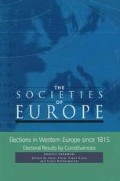Abstract
In 1808 Finland, formerly a Swedish province, became part of the Tsarist empire of Alexander I as a result of Sweden’s defeat in the war against Russia. Since the twelfth century, Finnish territories had been controlled by their powerful Swedish neighbour, but already in 1721 Sweden had lost south-eastern Karelia with the city of Viipuri (Wiborg) to Russia. In 1809, the new Grand Principality of Finland was granted some autonomy within the Russian empire; that same year Finland acquired the Tornio River basin, in 1811 the province of Viipuri (Wiborg), and in 1820 the harbour of Petsamo. The Swedish Constitution of 1772 (the Regeringsform, revised in 1789) remained in force (see also Country Chapter 16 on Sweden) even though the tsar had the absolute power of convening the four-estate Diet, which did not occur until 1863.
Preview
Unable to display preview. Download preview PDF.
Copyright information
© 2000 Daniele Caramani
About this chapter
Cite this chapter
Caramani, D. (2000). Finland. In: Elections in Western Europe since 1815. The Societies of Europe. Palgrave Macmillan, London. https://doi.org/10.1007/978-1-349-65508-3_8
Download citation
DOI: https://doi.org/10.1007/978-1-349-65508-3_8
Publisher Name: Palgrave Macmillan, London
Print ISBN: 978-0-333-77111-2
Online ISBN: 978-1-349-65508-3
eBook Packages: Palgrave History CollectionHistory (R0)

